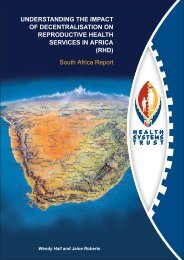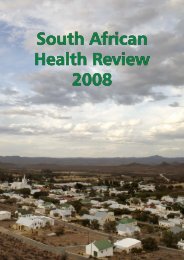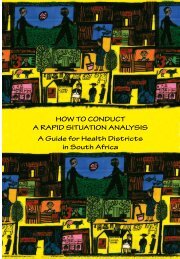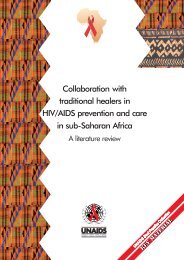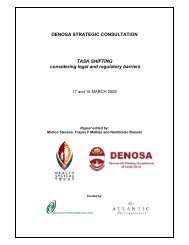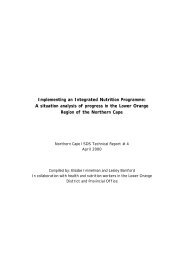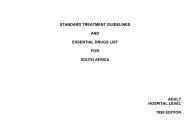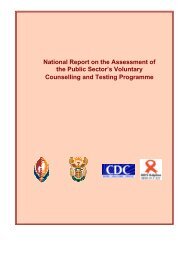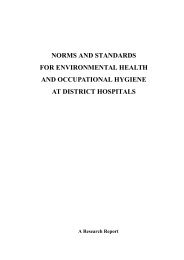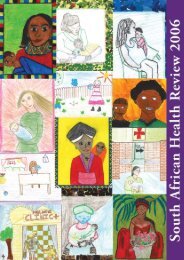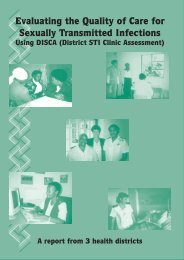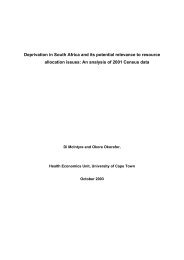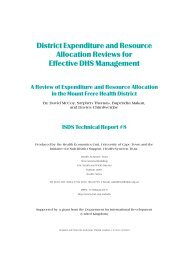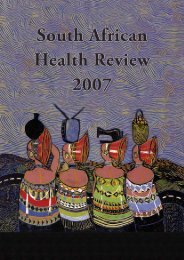PMTCT, and National's - Health Systems Trust
PMTCT, and National's - Health Systems Trust
PMTCT, and National's - Health Systems Trust
Create successful ePaper yourself
Turn your PDF publications into a flip-book with our unique Google optimized e-Paper software.
WHO 2 recommends that at least 50% of partners of antenatal clients should be tested for HIV.<br />
This is quite an ambitious target given the current situation therefore serious attention should<br />
be focussed on strategies to increase male involvement in this programme.<br />
HIV testing in labour<br />
Very few facilities offer counselling <strong>and</strong> HIV testing to women during labour. This is partly<br />
because health workers do not feel that it is appropriate, <strong>and</strong> partly because lay counsellors<br />
are not available in many delivery wards. An evaluation of obstetric services conducted by<br />
HST 4 found that in most of the facilities surveyed, the physical layout of the labour ward made<br />
privacy for counselling difficult. Women arriving in labour were usually separated from family<br />
<strong>and</strong>/or friends, thus allowing questions about HIV status <strong>and</strong> nevirapine to be asked privately.<br />
Confidentiality was more difficult when this initial evaluation occurred in a room occupied<br />
by more than one patient – this occurred in 73% of the facilities surveyed. Nurses complained<br />
that in rooms where beds are separated only by a curtain, even whispered conversations can<br />
be overheard. A few sites offered counselling <strong>and</strong> testing to women in early labour, a service<br />
provided by nurses <strong>and</strong> midwives. Some patients were given results immediately, others after<br />
birth.<br />
The policy regarding counselling <strong>and</strong> testing in labour should be revisited. However, it should<br />
be emphasised that testing should be offered to all women of unknown status postpartum in<br />
order for missed opportunities for treating infants to be avoided. Studies are planned to<br />
compare the efficacy of post exposure nevirapine prophylaxis to infants only versus doses to<br />
both mother <strong>and</strong> infant. These results may remove the dilemma regarding testing <strong>and</strong> treatment<br />
during labour if the infant only prophylaxis proves as effective as doses to both mother <strong>and</strong><br />
infant.<br />
Ongoing counselling <strong>and</strong> support<br />
The South African National Protocol for the <strong>PMTCT</strong> pilot sites 5 states that counselling should<br />
involve a pre-test session, post-test session <strong>and</strong> that HIV positive women should be offered<br />
counselling at every subsequent antenatal visit. The purpose of these sessions is to assist women<br />
to cope with the diagnosis <strong>and</strong> to make plans to prevent HIV transmission to the infant. Despite<br />
this recommendation that counselling should occur beyond the context of testing, field visits<br />
for this evaluation confirmed that little ongoing counselling is taking place.<br />
The lack of ongoing support is of particular concern in relation to infant feeding counselling.<br />
Infant feeding options are included in the post-test counselling session for HIV positive women<br />
along with a host of other information. The time immediately following an HIV positive diagnosis<br />
is one of confusion, perhaps anger <strong>and</strong> shock. Attempting to convey large amounts of<br />
information during this time may often not seem appropriate or compassionate. However, due<br />
to the shortage of staff in most facilities, which limits opportunities for ongoing counselling<br />
<strong>and</strong> support, this is where issues such as infant feeding options are discussed. Ideally this<br />
should be done in a follow up counselling session once the mother has had an opportunity<br />
to deal with the initial impact of her HIV status.<br />
Given the constraints to support at the facility level, strengthening of community links is essential<br />
to provide follow up support for mothers both antenatally <strong>and</strong> postnatally. The care <strong>and</strong> support<br />
links between facilities <strong>and</strong> local NGOs remain poor in many of the sites. Interviews during<br />
site visits revealed that referrals from sites are made largely to secondary <strong>and</strong> tertiary medical<br />
facilities, <strong>and</strong> not to NGOs to meet care <strong>and</strong> support needs. The involvement of NGOs appears<br />
to be limited to supplying lay counsellors. Ongoing community support can assist with disclosure,<br />
infant feeding practices, reducing stigma <strong>and</strong> linking individuals with community resources.<br />
Support groups are also a valuable place where women can share their experiences with<br />
others <strong>and</strong> gain from the group support. Unfortunately very few sites have been able to<br />
implement <strong>PMTCT</strong> support groups. This is due to many reasons including:<br />
• Lack of space within facilities<br />
• Shortage of staff to facilitate the group<br />
• Fear on the part of women of being identified as HIV positive<br />
20



